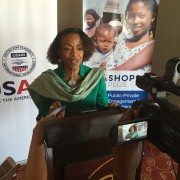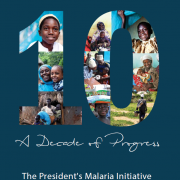
6.1 million people, 23.3% of the total population of Madagascar (INSTAT, 2015), will benefit from a new 5-year, $30 million USD integrated community health program funded by the United States Agency for International Development (USAID). The program is a collaboration between the Minstry of Public Health, USAID and JSI Research & Training Institute, Inc. (JSI).

I would like to express my sincere appreciation to all of you for your work, contributions to and participation in the SCAPES program implementation. We can say, with conviction, that the SCAPES project has been a great success. All your support has been invaluable, and we must continue to work hard to consolidate the gains made under SCAPES.

Recognizing the important role played by private businesses to provide essential health services to the Malagasy people, a partnership agreement was officially launched on September 16 between the U.S. government through USAID and AccèsBanque to encourage health businesses and practitioners across Madagascar to seek out loans to grow their businesses. SHOPS Plus (Sustaining Health Outcomes through Private Sectors), a USAID-funded project, will bring technical assistance to help develop and sell the loan products.

he U.S. Embassy in Madagascar, through the U.S. Agency for International Development (USAID), is providing $8 million in additional emergency humanitarian assistance to help people suffering from the ongoing drought in the south of Madagascar. The funding will be used to provide food and nutritional supplements to people in the Androy, Atsimo Andrefana and Anosy regions, which have been the most deeply affected by the drought. The program will be carried out by the World Food Programme.

The U.S. President’s Malaria Initiative (PMI), led by the U.S. Agency for International Development and implemented together with the Centers for Disease Control and Prevention (CDC), today released its tenth annual report, documenting progress across its programs including in Madagascar. Since 2004, Madagascar has reduced mortality among children under five by 23 percent as a direct result of action by the government, communities, donors, and partners. Malaria is a major killer of young children, and during pregnancy malaria can pose a serious, life-threatening risk to a woman and her baby.








![Cover: Paradise Lost? Lessons from 25 years of environment programs in Madagascar - Click to read publication [PDF, 3MB] Cover: Paradise Lost? Lessons from 25 years of environment programs in Madagascar](https://2012-2017-uat.usaid.gov/sites/default/files/styles/732_width/public/nodeimage/paradise_lost_0.jpg?itok=klue3vb3)
Comment
Make a general inquiry or suggest an improvement.